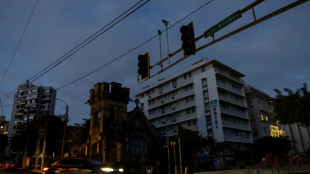

Five forgotten conflicts of 2024
The wars in the Mideast and Ukraine-Russia have dominated world headlines in 2024 but several other conflicts are ravaging countries and regions.
Here we turn the spotlight on five of those:
- Sudan -
War has raged in Sudan since April 2023 between the Sudanese army and the paramilitary Rapid Support Forces (RSF).
The conflict has left tens of thousands dead and some 26 million people -- around half of Sudan's population -- facing severe food insecurity.
Both sides have been accused of war crimes, including targeting civilians and blocking humanitarian aid. The RSF specifically have been accused of ethnic cleansing, rampant looting and systematic sexual violence.
In October the UN alerted the "staggering scale" of sexual violence rampant since the start of the conflict.
- Haiti -
The situation in Haiti, already dire after decades of chronic political instability, escalated further at the end of February when armed groups launched coordinated attacks in the capital, saying they wanted to overthrow then-prime minister Ariel Henry.
Since then, gangs now control 80 percent of the capital Port-au-Prince and despite a Kenyan-led police support mission, backed by the US and UN, violence has continued to soar.
In November the UN said the verified casualty toll of the gang violence so far this year was 4,544 dead and the real toll, it stressed, "is likely higher still".
Particularly violent acts target women and girls, and victims have been mutilated with machetes, stoned, decapitated, burned or buried alive.
More than 700,000 people have fled the horror, half of them children, according to the International Organization for Migration.
- Democratic Republic of Congo -
The mineral-rich region of eastern Democratic Republic of Congo, home to a string of rival rebel groups, has endured internal and cross-border violence for over 30 years.
Since launching an offensive in 2021, a largely Tutsi militia known as the March 23 movement or M23 -- named after a previous peace agreement -- has seized large swathes of territory.
The resurgence of M23 has intensified a decades-long humanitarian disaster in the region caused by conflicts, epidemics and poverty, notably in the province of North Kivu.
Over half a million people have fled to camps surrounding the regional capital, Goma, pushing the total number of displaced in North Kivu to about 2.4 million, according to Human Rights Watch in September.
M23 is backed by the Rwandan government which believes the presence in eastern DRC of a Hutu extremist group constitutes a threat to its borders.
- Sahel -
In Africa's volatile Sahel region, Islamist groups, rebel outfits and armed gangs rule the roost.
In Nigeria in 2009 Boko Haram, one of the main jihadist organisations in the Sahel region, launched an insurgency that left more than 40,000 people dead and displaced two million.
Boko Haram has since spread to neighbouring countries in West Africa.
For example, the vast expanse of water and swamps in the Lake Chad region's countless islets serve as hideouts for Boko Haram and its offshoot Islamic State in West Africa (ISWAP), who carry out regular attacks on the country's army and civilians.
Mali, Burkina Faso and Niger also face persistent jihadist attacks, while any opposition to the military-led governments is repressed.
Since January, jihadist attacks have caused nearly 7,000 civilian and military deaths in Burkina Faso, more than 1,500 in Niger and more than 3,600 in Mali, according to Acled -- an NGO which collects data on violent conflict.
And in a further sign of the region's chronic instability, in July the West African bloc ECOWAS warned the Sahel faced "disintegration" after the military rulers of Niger, Mali and Burkina Faso cemented a breakaway union.
- Myanmar -
The Southeast Asian nation has been gripped in a bloody conflict since 2021 when the military ousted the democratically elected government led by Nobel laureate Aung Sang Suu Kyi, who has been detained by the junta since the coup.
A bitter civil war has followed causing the death of more than 5,300 people and the displacement of some 3.3 million, according to the UN.
The military have faced growing resistance from rebel groups across the country.
In recent months rebels attacked Mandalay, the country's second-largest city, and took control of the key road linking Myanmar with China -- its main trading partner -- and in doing so deprived the junta of a key source of revenue.
R.Schiltz--LiLuX


